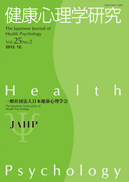15 巻, 1 号
選択された号の論文の7件中1~7を表示しています
- |<
- <
- 1
- >
- >|
原著
-
原稿種別: 原著
2002 年 15 巻 1 号 p. 1-9
発行日: 2002/06/25
公開日: 2015/01/07
PDF形式でダウンロード (1316K) -
原稿種別: 原著
2002 年 15 巻 1 号 p. 10-20
発行日: 2002/06/25
公開日: 2015/01/07
PDF形式でダウンロード (1669K) -
原稿種別: 原著
2002 年 15 巻 1 号 p. 21-31
発行日: 2002/06/25
公開日: 2015/01/07
PDF形式でダウンロード (1577K) -
原稿種別: 原著
2002 年 15 巻 1 号 p. 32-40
発行日: 2002/06/25
公開日: 2015/01/07
PDF形式でダウンロード (1293K) -
原稿種別: 原著
2002 年 15 巻 1 号 p. 41-48
発行日: 2002/06/25
公開日: 2015/01/07
PDF形式でダウンロード (1177K) -
原稿種別: 原著
2002 年 15 巻 1 号 p. 49-58
発行日: 2002/06/25
公開日: 2015/01/07
PDF形式でダウンロード (1289K)
資料
-
原稿種別: 資料
2002 年 15 巻 1 号 p. 59-63
発行日: 2002/06/25
公開日: 2015/01/07
PDF形式でダウンロード (641K)
- |<
- <
- 1
- >
- >|
